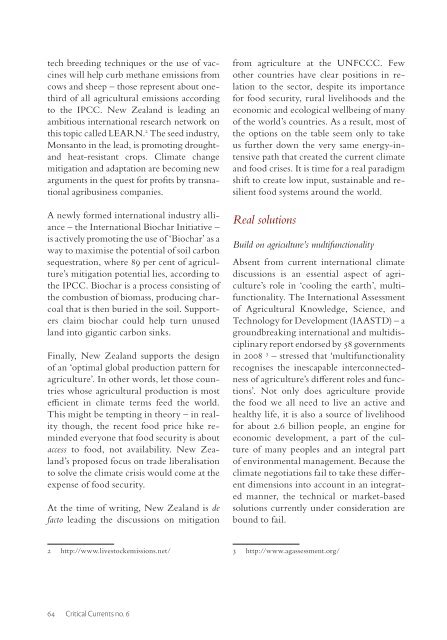Contours of Climate Justice - Dag Hammarskjöld Foundation
Contours of Climate Justice - Dag Hammarskjöld Foundation
Contours of Climate Justice - Dag Hammarskjöld Foundation
You also want an ePaper? Increase the reach of your titles
YUMPU automatically turns print PDFs into web optimized ePapers that Google loves.
tech breeding techniques or the use <strong>of</strong> vaccines<br />
will help curb methane emissions from<br />
cows and sheep – those represent about onethird<br />
<strong>of</strong> all agricultural emissions according<br />
to the IPCC. New Zealand is leading an<br />
ambitious international research network on<br />
this topic called LEARN. 2 The seed industry,<br />
Monsanto in the lead, is promoting drought-<br />
and heat-resistant crops. <strong>Climate</strong> change<br />
mitigation and adaptation are becoming new<br />
arguments in the quest for pr<strong>of</strong>i ts by transnational<br />
agribusiness companies.<br />
A newly formed international industry alliance<br />
– the International Biochar Initiative –<br />
is actively promoting the use <strong>of</strong> ‘Biochar’ as a<br />
way to maximise the potential <strong>of</strong> soil carbon<br />
sequestration, where 89 per cent <strong>of</strong> agriculture’s<br />
mitigation potential lies, according to<br />
the IPCC. Biochar is a process consisting <strong>of</strong><br />
the combustion <strong>of</strong> biomass, producing charcoal<br />
that is then buried in the soil. Supporters<br />
claim biochar could help turn unused<br />
land into gigantic carbon sinks.<br />
Finally, New Zealand supports the design<br />
<strong>of</strong> an ‘optimal global production pattern for<br />
agriculture’. In other words, let those countries<br />
whose agricultural production is most<br />
effi cient in climate terms feed the world.<br />
This might be tempting in theory – in reality<br />
though, the recent food price hike reminded<br />
everyone that food security is about<br />
access to food, not availability. New Zealand’s<br />
proposed focus on trade liberalisation<br />
to solve the climate crisis would come at the<br />
expense <strong>of</strong> food security.<br />
At the time <strong>of</strong> writing, New Zealand is de<br />
facto leading the discussions on mitigation<br />
2 http://www.livestockemissions.net/<br />
64 Critical Currents no. 6<br />
from agriculture at the UNFCCC. Few<br />
other countries have clear positions in relation<br />
to the sector, despite its importance<br />
for food security, rural livelihoods and the<br />
economic and ecological wellbeing <strong>of</strong> many<br />
<strong>of</strong> the world’s countries. As a result, most <strong>of</strong><br />
the options on the table seem only to take<br />
us further down the very same energy-intensive<br />
path that created the current climate<br />
and food crises. It is time for a real paradigm<br />
shift to create low input, sustainable and resilient<br />
food systems around the world.<br />
Real solutions<br />
Build on agriculture’s multifunctionality<br />
Absent from current international climate<br />
discussions is an essential aspect <strong>of</strong> agriculture’s<br />
role in ‘cooling the earth’, multifunctionality.<br />
The International Assessment<br />
<strong>of</strong> Agricultural Knowledge, Science, and<br />
Technology for Development (IAASTD) – a<br />
groundbreaking international and multidisciplinary<br />
report endorsed by 58 governments<br />
in 2008 3 – stressed that ‘multifunctionality<br />
recognises the inescapable interconnectedness<br />
<strong>of</strong> agriculture’s diff erent roles and functions’.<br />
Not only does agriculture provide<br />
the food we all need to live an active and<br />
healthy life, it is also a source <strong>of</strong> livelihood<br />
for about 2.6 billion people, an engine for<br />
economic development, a part <strong>of</strong> the culture<br />
<strong>of</strong> many peoples and an integral part<br />
<strong>of</strong> environmental management. Because the<br />
climate negotiations fail to take these diff erent<br />
dimensions into account in an integrated<br />
manner, the technical or market-based<br />
solutions currently under consideration are<br />
bound to fail.<br />
3 http://www.agassessment.org/
















